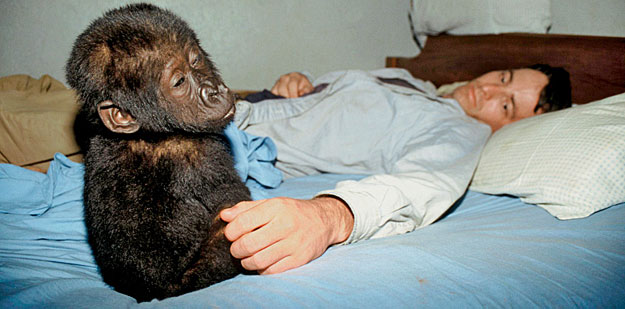sierraclub.org - sierra magazine - march/april 2009 - smile


Ponder | Your Place in Nature
Baby Jack's Dark Journey
By David McDannald

Jack with the author in Abong-Mbang, Cameroon.
Near midnight I shut the door of our dim hotel room in Abong-Mbang, Cameroon.
"Daudi, I don't want you coming," said Ofir Drori, invoking my Swahili name. "I'm a bit scared, and I don't know what's going to happen."
This from a man who'd been in Freetown, Sierra Leone, when rebels attacked. Drori was an Israeli activist dedicated to rescuing great apes. Five years in Africa and chronic malaria showed in his emaciated face and high collarbones, which made him look as if he were being held off the ground by the scruff of his neck.
A phone call had brought us into the rainforest: "You have to take him fast. Come quickly!" It was Kalebass, a music teacher and informant in Drori's evolving model for battling wildlife crime. He spoke of an orphaned chimpanzee captured by a hunter--for curiosity, future meat, or sale into the pet trade.
The village center was dark, bereft of its daytime buzz of Congolese jazz, motorcycle taximen, and women cooking mackerel over old wheel drums. The market there, built by forced labor under German rule in the style of a beer hall, fills each morning with bush meat. Antelope or elephant, crocodile or chimpanzee, it doesn't matter. Meat is meat, and meat is money. Bribes have subverted laws against the hunting and trafficking of endangered species, making bush meat a multinational industry.
Drori found his way through the darkness and knocked on the door of Kalebass's cinder-block and sheet-metal house. Kalebass appeared, carrying not a chimpanzee but a baby gorilla. Drori shivered: Young gorillas seldom survive the death of their clan. He was also upset. "I want to be the one to deal with the hunters," he insisted. "If we pay them, we create a market ourselves." Kalebass, who had met the hunter in the bush, said he had paid only a symbolic price. "I thought it best to get Jack to town."
Back in the hotel room, we fed the gorilla bananas and milk and tickled him along the arms, his laughter like the panting of a dog. Drori, Jack, and I shared a dank double bed, and Jack slept curled on my chest, his head jammed under my chin. When I tried to move him, he barked: "Ooh! Ooh!"
We woke the next morning to the squeal of pigs fornicating behind the hotel. Jack's scabies itched over my cheeks. A gorilla turd sat in my boot.
Jack shrieked when we forced him into a cardboard box that evening. Drori taped the lid shut and loaded him into the trunk of Abong-Mbang's lone available taxi. Because we refused to pay the bribe the local delegate of the Ministry of the Environment and Forestry had wanted, we had no authorization to possess or transport the ape and were breaking the law. With a dozen roadblocks separating us from Drori's home in Yaounde, we were vulnerable to policemen earning a living from bribes, who wouldn't easily turn loose a pair of foreigners moving contraband.
Half an hour into the darkness outside town, we were stopped for the first time. At each barricade, our driver revved the engine to keep the taxi from stalling and to mask Jack's muffled screams, and held two or three cigarettes out the window. Policemen withdrew nail-studded boards from the route and let us pass.
We stalled, blew a tire, got stuck in the mud, and stalled again. Marooned on the dark and muddy road, I thought of what Kalebass had told us about his two days with Jack. "There is something new. It is my heart that has saved the message. From now," he said, waving his hand to imply the future, "I will be very sentimental."
A minivan finally rolled up. Drori and I loaded Jack's box into the back and crammed in with the 22 other passengers. A cry rose over the rattling van--the goats roped to the roof, I hoped, and not Jack struggling for air. Policemen stopped us again and again through the night, as 24 travelers provided a universe of possible bribes. But no one found the gorilla; he'd gone silent.
Near dawn we reached Drori's house at the edge of Yaounde. He looked up while untaping the box. "If something is wrong, just remember we tried our best."
Drori opened the cardboard flaps and took the gorilla in his arms. Jack had survived. He now lives in a sanctuary with other orphaned gorillas. And the Cameroonian government, working with Drori's organization, the Last Great Ape (laga-enforcement.org), now averages one arrest per week of those hunting and trafficking in endangered species.
David McDannald is writing a book about Ofir Drori.
Photo by Ofir Drori; used with permission.